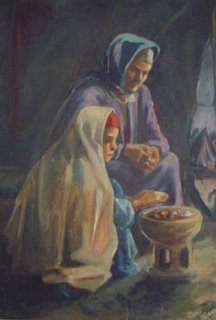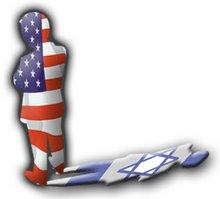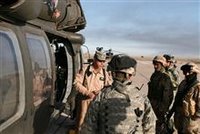Jonathan Cook, The Electronic Initfada, 19 December 2006 Palestinian security forces clash with Hamas demonstrators after the Friday prayers in the West Bank city of Ramallah, 15 December 2006. At least thirty Palestinians were injured as supporters from Fatah and Hamas clashed following an attempted assassination of Prime Minister Ismail Haniyeh as he returned to Gaza the previous day. (MaanImages/Fadi Arouri)
Palestinian security forces clash with Hamas demonstrators after the Friday prayers in the West Bank city of Ramallah, 15 December 2006. At least thirty Palestinians were injured as supporters from Fatah and Hamas clashed following an attempted assassination of Prime Minister Ismail Haniyeh as he returned to Gaza the previous day. (MaanImages/Fadi Arouri)
The era of the Middle East strongman, propped up by and enforcing Western policy, appears well and truly over. His power is being replaced with rule by civil war(1), apparently now the American administration's favoured model across the region.
Fratricidal fighting is threatening to engulf, or already engulfing, the occupied Palestinian territories, Lebanon and Iraq. Both Syria and Iran could soon be next, torn apart by attacks Israel is reportedly planning on behalf of the US. The reverberations would likely consume the region.
Western politicians like to portray civil war as a consequence of the West's failure to intervene more effectively in the Middle East. Were we more engaged in the Israeli-Palestinian conflict, or more aggressive in opposing Syrian manipulations in Lebanon, or more hands-on in Iraq, the sectarian fighting could be prevented. The implication being, of course, that, without the West's benevolent guidance, Arab societies are incapable of dragging themselves out of their primal state of barbarity.
But in fact, each of these breakdowns of social order appears to have been engineered either by the United States or by Israel. In Palestine, Lebanon and Iraq, sectarian difference is less important than a clash of political ideologies and interests as rival factions disagree about whether to submit to, or resist, American and Israeli interference. Where the factions derive their funding and legitimacy from -- increasingly a choice between the US or Iran -- seems to determine where they stand in this confrontation.
Palestine is in ferment because ordinary Palestinians are torn between their democratic wish to see Israeli occupation resisted -- in free elections they showed they believed Hamas the party best placed to realise that goal -- and the basic need to put food on the table for their families. The combined Israeli and international economic siege of the Hamas government, and the Palestinian population, has made a bitter internal struggle for control of resources inevitable.
Lebanon is falling apart because the Lebanese are divided: some believe that the country's future lies with attracting Western capital and welcoming Washington's embrace, while others regard America's interest as cover for Israel realising its long-standing design to turn Lebanon into a vassal state, with or without a military occupation. Which side the Lebanese choose in the current stand-off reflects their judgment of how plausible are claims of Western and Israeli benevolence.
And the slaughter in Iraq is not simply the result of lawlessness -- as is commonly portrayed -- but also about rival groups, the nebulous "insurgents", employing various brutal and conflicting strategies: trying to oust the Anglo-American occupiers and punish local Iraqis suspected of collaborating with them; extracting benefits from the puppet Iraqi regime; and jockeying for positions of influence before the inevitable grand American exit.
All of these outcomes in Palestine, Lebanon and Iraq could have been foreseen -- and almost certainly were. More than that, it looks increasingly like the growing tensions and carnage were planned. Rather than an absence of Western intervention being the problem, the violence and fragmentation of these societies seems to be precisely the goal of the intervention.
Evidence has emerged in Britain that suggests such was the case in Iraq. Testimony given by a senior British official to the 2004 Butler inquiry investigating intelligence blunders in the run-up to the invasion of Iraq was belatedly published last week, after attempts by the Foreign Office to hush it up.
Carne Ross, a diplomat who helped to negotiate several UN security council resolutions on Iraq, told the inquiry that British and US officials knew very well that Saddam Hussein had no WMDs and that bringing him down would lead to chaos.
I remember on several occasions the UK team stating this view in terms during our discussions with the US (who agreed)," he said, adding: "At the same time, we would frequently argue, when the US raised the subject, that 'regime change' was inadvisable, primarily on the grounds that Iraq would collapse into chaos."
The obvious question, then, is why would the US want and intend civil war raging across the Middle East, apparently threatening strategic interests like oil supplies and the security of a key regional ally, Israel?
Until the presidency of Bush Jnr, the American doctrine in the Middle East had been to install or support strongmen, containing them or replacing them when they fell out of favour. So why the dramatic and, at least ostensibly, incomprehensible shift in policy?
Why allow Yasser Arafat's isolation and humiliation in the occupied territories, followed by Mahmoud Abbas's, when both could have easily been cultivated as strongmen had they been given the tools they were implicitly promised by the Oslo process: a state, the pomp of office and the coercive means to impose their will on rival groups like Hamas? With almost nothing to show for years of concessions to Israel, both looked to the Palestinian public more like lapdogs rather than rottweilers.
Why make a sudden and unnecessary fuss about Syria's interference in Lebanon, an interference that the West originally encouraged as a way to keep the lid on sectarian violence? Why oust Damascus from the scene and then promote a "Cedar Revolution" that pandered to the interests of only one section of Lebanese society and continued to ignore the concerns of the largest and most dissatisfied community, the Shia? What possible outcome could there be but simmering resentment and the threat of violence?
And why invade Iraq on the hollow pretext of locating WMDs and then dislodge its dictator, Saddam Hussein, who for decades had been armed and supported by the US and had very effectively, if ruthlessly, held Iraq together? Again from Carne's testimony, it is clear that no one in the intelligence community believed Saddam really posed a threat to the West. Even if he needed "containing" or possibly replacing, as Bush's predecessors appeared to believe, why did the president decide simply to overthrow him, leaving a power void at Iraq's heart?
The answer appears to be related to the rise of the neocons, who finally grasped power with the election of President Bush. Israel's most popular news website, Ynet, recently observed of the neocons: "Many are Jews who share a love for Israel."
The neocons' vision of American global supremacy is intimately tied to, and dependent on, Israel's regional supremacy. It is not so much that the neocons choose to promote Israel's interests above those of America as that they see the two nations' interests as inseparable and identical.
Although usually identified with the Israeli right, the neocons' political alliance with the Likud mainly reflects their support for adopting belligerent means to achieve their policy goals rather than the goals themselves.
The consistent aim of Israeli policy over decades, from the left and right, has been to acquire more territory at the expense of its neighbours and entrench its regional supremacy through "divide and rule", particularly of its weakest neighbours such as the Palestinians and the Lebanese. It has always abominated Arab nationalism, especially of the Baathist variety in Iraq and Syria, because it appeared immune to Israeli intrigues.
For many years Israel favoured the same traditional colonial approach the West used in the Middle East, where Britain, France and later the US supported autocratic leaders, usually from minority populations, to rule over the majority in the new states they had created, whether Christians in Lebanon, Alawites in Syria, Sunnis in Iraq, or Hashemites in Jordan. The majority was thereby weakened, and the minority forced to become dependent on colonial favours to maintain its privileged position.
 The symbols of Hizballah and the Free Patriotic Movement joined together in one flag to show the strength of their pact. (Photo: Sami Hermez)Israel's invasion of Lebanon in 1982, for example, was similarly designed to anoint a Christian strongman and US stooge, Bashir Gemayel, as a compliant president who would agree to an anti-Syrian alliance with Israel.But decades of controlling and oppressing Palestinian society allowed Israel to develop a different approach to divide and rule: what might be termed organised chaos, or the "discord" model, one that came to dominate first its thinking and later that of the neocons.During its occupation of the West Bank and Gaza, Israel preferred discord to a strongman, aware that a pre-requisite of the latter would be the creation of a Palestinian state and its furnishing with a well-armed security force. Neither option was ever seriously contemplated.Only briefly under international pressure was Israel forced to relent and partially adopt the strongman model by allowing the return of Yasser Arafat from exile. But Israel's reticence in giving Arafat the means to assert his rule and suppress his rivals, such as Hamas, led inevitably to conflict between the Palestinian president and Israel that ended in the second intifada and the readoption of the discord model.This latter approach exploits the fault lines in Palestinian society to exacerbate tensions and violence. Initially Israel achieved this by promoting rivalry between regional and clan leaders who were forced to compete for Israel's patronage. Later Israel encouraged the emergence of Islamic extremism, especially in the form of Hamas, as a counterweight to the growing popularity of the secular nationalism of Arafat's Fatah party.Israel's discord model is now reaching its apotheosis: low-level and permanent civil war between the old guard of Fatah and the upstarts of Hamas. This kind of Palestinian in-fighting usefully depletes the society's energies and its ability to organise against the real enemy: Israel and its enduring occupation.The neocons, it appears, have been impressed with this model and wanted to export it to other Middle Eastern states. Under Bush they sold it to the White House as the solution to the problems of Iraq and Lebanon, and ultimately of Iran and Syria too.The provoking of civil war certainly seemed to be the goal of Israel's assault on Lebanon over the summer. The attack failed, as even Israelis admit, because Lebanese society rallied behind Hizbullah's impressive show of resistance rather than, as was hoped, turning on the Shia militia.Last week the Israeli website Ynet interviewed Meyrav Wurmser, an Israeli citizen and co-founder of MEMRI, a service translating Arab leaders' speeches that is widely suspected of having ties with Israel's security services. She is also the wife of David Wurmser, a senior neocon adviser to Vice-President Dick Cheney.Meyrav Wurmser revealed that the American Administration had publicly dragged its feet during Israel's assault on Lebanon because it was waiting for Israel to expand its attack to Syria."The anger [in the White House] is over the fact that Israel did not fight against the Syrians ... The neocons are responsible for the fact that Israel got a lot of time and space ... They believed that Israel should be allowed to win. A great part of it was the thought that Israel should fight against the real enemy, the one backing Hizbullah. It was obvious that it is impossible to fight directly against Iran, but the thought was that its [Iran's] strategic and important ally [Syria] should be hit."Wurmser continued: "It is difficult for Iran to export its Shiite revolution without joining Syria, which is the last nationalistic Arab country. If Israel had hit Syria, it would have been such a harsh blow for Iran that it would have weakened it and [changed] the strategic map in the Middle East."Neocons talk a great deal about changing maps in the Middle East. Like Israel's dismemberment of the occupied territories into ever-smaller ghettos, Iraq is being severed into feuding mini-states. Civil war, it is hoped, will redirect Iraqis' energies away from resistance to the US occupation and into more negative outcomes.Similar fates appear to be awaiting Iran and Syria, at least if the neocons, despite their waning influence, manage to realise their vision in Bush's last two years.The reason is that a chaotic and feuding Middle East, although it would be a disaster in the view of most informed observers, appears to be greatly desired by Israel and its neocon allies. They believe that the whole Middle East can be run successfully the way Israel has run its Palestinian populations inside the occupied territories, where religious and secular divisions have been accentuated, and inside Israel itself, where for many decades Arab citizens were "de-Palestinianised" and turned into identity-starved and quiescent Muslims, Christians, Druze and Bedouin.That conclusion may look foolhardy, but then again so does the White House's view that it is engaged in a "clash of civilisations" which it can win with a "war on terror".All states are capable of acting in an irrational or self-destructive manner, but Israel and its supporters may be more vulnerable to this failing than most. That is because Israelis' perception of their region and their future has been grossly distorted by the official state ideology, Zionism, with its belief in Israel's inalienable right to preserve itself as an ethnic state; its confused messianic assumptions, strange for a secular ideology, about Jews returning to a land promised by God; and its contempt for, and refusal to understand, everything Arab or Muslim.If we expect rational behaviour from Israel or its neocon allies, more fool us.Jonathan Cook is a writer and journalist based in Nazareth, Israel. His book, Blood and Religion: The Unmasking of the Jewish and Democratic State, is published by Pluto Press.(1) The concept of civil war is foreign to the Middle East.
The symbols of Hizballah and the Free Patriotic Movement joined together in one flag to show the strength of their pact. (Photo: Sami Hermez)Israel's invasion of Lebanon in 1982, for example, was similarly designed to anoint a Christian strongman and US stooge, Bashir Gemayel, as a compliant president who would agree to an anti-Syrian alliance with Israel.But decades of controlling and oppressing Palestinian society allowed Israel to develop a different approach to divide and rule: what might be termed organised chaos, or the "discord" model, one that came to dominate first its thinking and later that of the neocons.During its occupation of the West Bank and Gaza, Israel preferred discord to a strongman, aware that a pre-requisite of the latter would be the creation of a Palestinian state and its furnishing with a well-armed security force. Neither option was ever seriously contemplated.Only briefly under international pressure was Israel forced to relent and partially adopt the strongman model by allowing the return of Yasser Arafat from exile. But Israel's reticence in giving Arafat the means to assert his rule and suppress his rivals, such as Hamas, led inevitably to conflict between the Palestinian president and Israel that ended in the second intifada and the readoption of the discord model.This latter approach exploits the fault lines in Palestinian society to exacerbate tensions and violence. Initially Israel achieved this by promoting rivalry between regional and clan leaders who were forced to compete for Israel's patronage. Later Israel encouraged the emergence of Islamic extremism, especially in the form of Hamas, as a counterweight to the growing popularity of the secular nationalism of Arafat's Fatah party.Israel's discord model is now reaching its apotheosis: low-level and permanent civil war between the old guard of Fatah and the upstarts of Hamas. This kind of Palestinian in-fighting usefully depletes the society's energies and its ability to organise against the real enemy: Israel and its enduring occupation.The neocons, it appears, have been impressed with this model and wanted to export it to other Middle Eastern states. Under Bush they sold it to the White House as the solution to the problems of Iraq and Lebanon, and ultimately of Iran and Syria too.The provoking of civil war certainly seemed to be the goal of Israel's assault on Lebanon over the summer. The attack failed, as even Israelis admit, because Lebanese society rallied behind Hizbullah's impressive show of resistance rather than, as was hoped, turning on the Shia militia.Last week the Israeli website Ynet interviewed Meyrav Wurmser, an Israeli citizen and co-founder of MEMRI, a service translating Arab leaders' speeches that is widely suspected of having ties with Israel's security services. She is also the wife of David Wurmser, a senior neocon adviser to Vice-President Dick Cheney.Meyrav Wurmser revealed that the American Administration had publicly dragged its feet during Israel's assault on Lebanon because it was waiting for Israel to expand its attack to Syria."The anger [in the White House] is over the fact that Israel did not fight against the Syrians ... The neocons are responsible for the fact that Israel got a lot of time and space ... They believed that Israel should be allowed to win. A great part of it was the thought that Israel should fight against the real enemy, the one backing Hizbullah. It was obvious that it is impossible to fight directly against Iran, but the thought was that its [Iran's] strategic and important ally [Syria] should be hit."Wurmser continued: "It is difficult for Iran to export its Shiite revolution without joining Syria, which is the last nationalistic Arab country. If Israel had hit Syria, it would have been such a harsh blow for Iran that it would have weakened it and [changed] the strategic map in the Middle East."Neocons talk a great deal about changing maps in the Middle East. Like Israel's dismemberment of the occupied territories into ever-smaller ghettos, Iraq is being severed into feuding mini-states. Civil war, it is hoped, will redirect Iraqis' energies away from resistance to the US occupation and into more negative outcomes.Similar fates appear to be awaiting Iran and Syria, at least if the neocons, despite their waning influence, manage to realise their vision in Bush's last two years.The reason is that a chaotic and feuding Middle East, although it would be a disaster in the view of most informed observers, appears to be greatly desired by Israel and its neocon allies. They believe that the whole Middle East can be run successfully the way Israel has run its Palestinian populations inside the occupied territories, where religious and secular divisions have been accentuated, and inside Israel itself, where for many decades Arab citizens were "de-Palestinianised" and turned into identity-starved and quiescent Muslims, Christians, Druze and Bedouin.That conclusion may look foolhardy, but then again so does the White House's view that it is engaged in a "clash of civilisations" which it can win with a "war on terror".All states are capable of acting in an irrational or self-destructive manner, but Israel and its supporters may be more vulnerable to this failing than most. That is because Israelis' perception of their region and their future has been grossly distorted by the official state ideology, Zionism, with its belief in Israel's inalienable right to preserve itself as an ethnic state; its confused messianic assumptions, strange for a secular ideology, about Jews returning to a land promised by God; and its contempt for, and refusal to understand, everything Arab or Muslim.If we expect rational behaviour from Israel or its neocon allies, more fool us.Jonathan Cook is a writer and journalist based in Nazareth, Israel. His book, Blood and Religion: The Unmasking of the Jewish and Democratic State, is published by Pluto Press.(1) The concept of civil war is foreign to the Middle East.












































